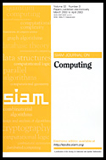
SIAM JOURNAL ON COMPUTING
metrics 2024
Unveiling Cutting-Edge Discoveries in Computing.
Introduction
Welcome to the SIAM Journal on Computing, a premier publication of SIAM Publications dedicated to advancing the field of computational science. Established in 1984, this journal provides a platform for groundbreaking research and theoretical advancements that shape the landscape of both Computer Science and Mathematics. With an impressive impact factor and consistently ranking in Q1 quartiles for its categories, the journal remains an essential resource for scholars looking to contribute to innovative computational theories and methodologies. Although not currently an open-access journal, the SIAM Journal on Computing offers rigorous peer-reviewed articles, ensuring high-quality contributions that appeal to researchers, professionals, and students alike. As we converge towards 2024, this journal continues to play a vital role in influencing future research directions and fostering an academic community devoted to the exploration of computational challenges. Join us in exploring the forefront of computing research!
Metrics 2024
 2.14
2.14 1.20
1.20 1.60
1.60 127
127Metrics History
Rank 2024
Scopus
IF (Web Of Science)
JCI (Web Of Science)
Quartile History
Similar Journals

Theoretical Computer Science
Bridging Theory and Application in Computer ScienceTheoretical Computer Science, published by Elsevier, serves as a pivotal platform in the field of computational theory, exploring the foundational aspects of computer science and mathematical logic since its inception in 1975. With both a print ISSN of 0304-3975 and an E-ISSN of 1879-2294, this journal is esteemed for its rigorous peer-review process and commitment to advancing knowledge in theoretical frameworks and algorithms. Positioned in the Q2 quartile for both Computer Science (miscellaneous) and Theoretical Computer Science categories, it ranks #124 out of 232 in general computer science and #73 out of 130 in theoretical computer science according to Scopus metrics, reflecting its significant influence and reach within the academic community. Researchers and professionals can access this journal through institutional subscriptions, providing a plethora of high-quality articles that contribute to ongoing debates and developments in the discipline. The journal's scope encompasses a wide array of topics, ensuring relevance across various subfields, thus making it an essential resource for anyone dedicated to furthering their understanding of theoretical computer science.
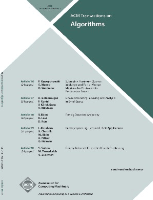
ACM Transactions on Algorithms
Advancing the Frontiers of Algorithmic KnowledgeACM Transactions on Algorithms (ISSN: 1549-6325, E-ISSN: 1549-6333) is an esteemed academic journal published by the Association for Computing Machinery (ACM), dedicated to advancing the field of algorithms within the broad domain of mathematics. With an impressive 2023 Quartile Ranking of Q1 in Mathematics (miscellaneous) and a Scopus rank placing it in the 15th percentile of its category, this journal is a pivotal resource for researchers, professionals, and students alike. Covering topics from algorithm design and analysis to applications in diverse areas, it serves as a platform for publishing high-quality, peer-reviewed research that significantly contributes to theoretical advancements and practical implementations. Although it is not an open-access journal, its impact in the academic community is profound, ensuring that vital findings reach a wide audience while promoting innovation and excellence in algorithm research. Established in 2005, with contributions continuing through 2024, ACM Transactions on Algorithms remains at the forefront of its field, underpinning significant developments and collaborations in algorithmic research.

EURO Journal on Computational Optimization
Shaping the Future of Optimization Techniques and ApplicationsEURO Journal on Computational Optimization, published by ELSEVIER, is a leading open-access journal that has been advancing the field of computational optimization since its inception in 2013. Catering to a diverse audience of researchers, professionals, and students, this journal addresses critical developments in computational mathematics, control and optimization, and management science. With an impressive Q1 category ranking in multiple areas, including Computational Mathematics and Management Science and Operations Research, the journal serves as a pivotal platform for disseminating groundbreaking research and innovative methodologies. Its commitment to open access ensures that valuable insights are readily available to the global academic community. With a continuous publication timeline through 2024, the EURO Journal on Computational Optimization is positioned at the forefront of its field, fostering collaboration and innovation in optimization techniques and applications.
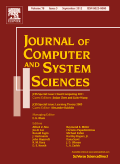
JOURNAL OF COMPUTER AND SYSTEM SCIENCES
Advancing the frontiers of computational knowledge.The Journal of Computer and System Sciences is a distinguished publication founded in 1967 and continually striving to push the boundaries of knowledge in computer science and applied mathematics. Published by Academic Press Inc, Elsevier Science, this journal boasts impressive credentials, holding a Q1 quartile ranking across multiple categories including Applied Mathematics, Computational Theory and Mathematics, Computer Networks and Communications, and Theoretical Computer Science as of 2023. With a focus on innovative research and comprehensive theoretical developments, this journal serves as a pivotal forum for authors and readers alike, facilitating cutting-edge contributions to the field. The journal is not currently open access, providing a curated selection of high-quality articles for its subscription residents. By engaging with this journal, researchers, professionals, and students can gain insight into the latest trends, prominent methodologies, and significant findings that shape the modern landscape of computing and systems analysis.

Annales Mathematicae et Informaticae
Advancing knowledge in mathematics and computer science.Annales Mathematicae et Informaticae is a prominent academic journal published by E K F LICEUM KIADO, based in Hungary. Dedicated to advancing the fields of mathematics and computer science, this journal has been a significant platform for scholarly discourse since its inception in 1997. With an ISSN of 1787-5021 and an E-ISSN of 1787-6117, it aims to publish high-quality research that contributes to the broader understanding and application of mathematical and computational principles. As a Q4 journal in both the Computer Science and Mathematics categories for 2023, it showcases a diverse range of research findings. The journal operates with an open access model, ensuring that research is freely accessible to all, thereby fostering collaboration and knowledge dissemination. Recognized for its role in academia, Annales Mathematicae et Informaticae serves as a valuable resource for researchers, professionals, and students who aspire to stay ahead in these dynamic fields.

THEORY OF COMPUTING SYSTEMS
Pioneering Research in Theoretical Computer ScienceTHEORY OF COMPUTING SYSTEMS, published by SPRINGER, is a renowned journal that has been a cornerstone in the fields of computational theory and theoretical computer science since its inception in 1996. With an ISSN of 1432-4350 and an E-ISSN of 1433-0490, this journal is committed to disseminating high-quality research that explores the underlying principles of computing systems and their theoretical foundations. Positioned in the Q2 category for both Computational Theory and Mathematics and Theoretical Computer Science, it plays a vital role in advancing scholarly dialogue and innovation within these disciplines, as evidenced by its rankings within the Scopus index. Researchers and professionals can access this journal in various formats, ensuring that cutting-edge research is readily available for a global audience. With a clear focus on fostering interdisciplinary collaboration and exploring emerging trends, THEORY OF COMPUTING SYSTEMS is essential reading for anyone interested in the evolution of computing theory and its applications.
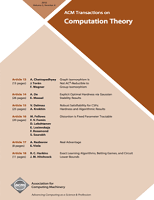
ACM Transactions on Computation Theory
Driving Innovation in Computational Theory and Mathematics.ACM Transactions on Computation Theory, published by the Association for Computing Machinery, is a prestigious journal dedicated to advancing the field of computation theory and theoretical computer science. With an ISSN of 1942-3454 and an E-ISSN of 1942-3462, this journal serves as a vital resource for researchers and professionals seeking to explore groundbreaking developments in computational models, algorithms, and their mathematical foundations. The journal's rigorous standards have earned it a significant position within the academic community, as evidenced by its 2023 category quartiles, ranking in the Q1 category for Computational Theory and Mathematics and Q2 for Theoretical Computer Science. Although it operates through traditional subscription access, it maintains a critical role in disseminating cutting-edge research and fostering collaboration among experts in the United States and beyond. As an influential platform, ACM Transactions on Computation Theory is committed to contributing to the ongoing dialogue and advancement of computation theory, making it essential reading for anyone passionate about this dynamic field.
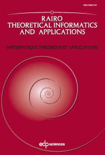
RAIRO-THEORETICAL INFORMATICS AND APPLICATIONS
Unraveling Complexities of Computational Theories.RAIRO - Theoretical Informatics and Applications is a renowned academic journal published by EDP Sciences S A that has been at the forefront of disseminating innovative research and applications in the fields of computer science and mathematics since its inception in 1995. With a focus on theoretical and applied aspects of informatics, the journal serves as a vital resource for researchers and professionals seeking to explore the intricacies of computational theories and their practical applications. Although currently lacking an Open Access model, it provides invaluable insights from distinguished researchers within its Q4 category rankings across its pertinent fields. As reflected in its Scopus rankings, including a position in the 24th percentile for General Mathematics and the 9th percentile for Computer Science Applications, RAIRO is pivotal in contributing to the ongoing discourse and advancements in theoretical informatics. Researchers, professionals, and students will find this journal critical in understanding emerging trends and challenges in the rapidly evolving domains of computer science and mathematics.

DISCRETE MATHEMATICS AND THEORETICAL COMPUTER SCIENCE
Advancing Knowledge at the Intersection of Mathematics and ComputingDISCRETE MATHEMATICS AND THEORETICAL COMPUTER SCIENCE, published by DISCRETE MATHEMATICS THEORETICAL COMPUTER SCIENCE in France, stands as a significant open-access journal since 1997, publishing innovative research articles within the intersecting disciplines of discrete mathematics and theoretical computer science. With an ISSN of 1462-7264 and an E-ISSN of 1365-8050, this journal aims to provide a platform for scholarly discourse and dissemination of knowledge, making it accessible to a global audience. It is recognized for its contributions, achieving a Q2 ranking in both Computer Science (Miscellaneous) and Discrete Mathematics and Combinatorics, alongside a Q3 ranking in Theoretical Computer Science as of 2023. The journal’s rigorous selection process ensures that only high-quality research is published, promoting advancements in these critical areas of study. Researchers, professionals, and students alike can benefit from its comprehensive articles that not only enhance theoretical understanding but also foster practical applications in the ever-evolving landscape of computer science.
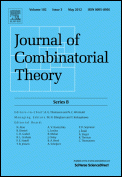
JOURNAL OF COMBINATORIAL THEORY SERIES B
Unveiling Insights in Combinatorial ResearchJOURNAL OF COMBINATORIAL THEORY SERIES B, published by Academic Press Inc., Elsevier Science, is an esteemed journal within the discipline of combinatorial theory, discrete mathematics, and theoretical computer science. With a rich history since its inception in 1971 and ongoing publication through 2025, this journal has established itself as a pillar in its field, currently holding Q1 category rankings in multiple areas including Computational Theory and Mathematics, Discrete Mathematics and Combinatorics, and Theoretical Computer Science. The journal features cutting-edge research and developments, attracting contributions from both established professionals and emerging scholars. Despite the absence of an open access option, the journal's strong impact reflected in its Scopus ranks—such as being number 16 out of 92 in Discrete Mathematics and Combinatorics (83rd percentile)—signifies its influential role in advancing knowledge and innovation. Researchers seeking to share impactful findings and connect with a vibrant academic community will find the JOURNAL OF COMBINATORIAL THEORY SERIES B an essential resource.